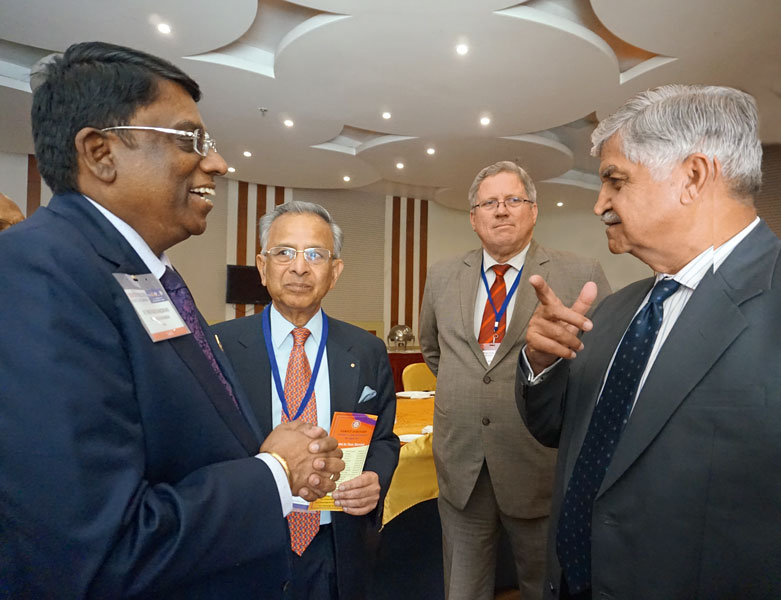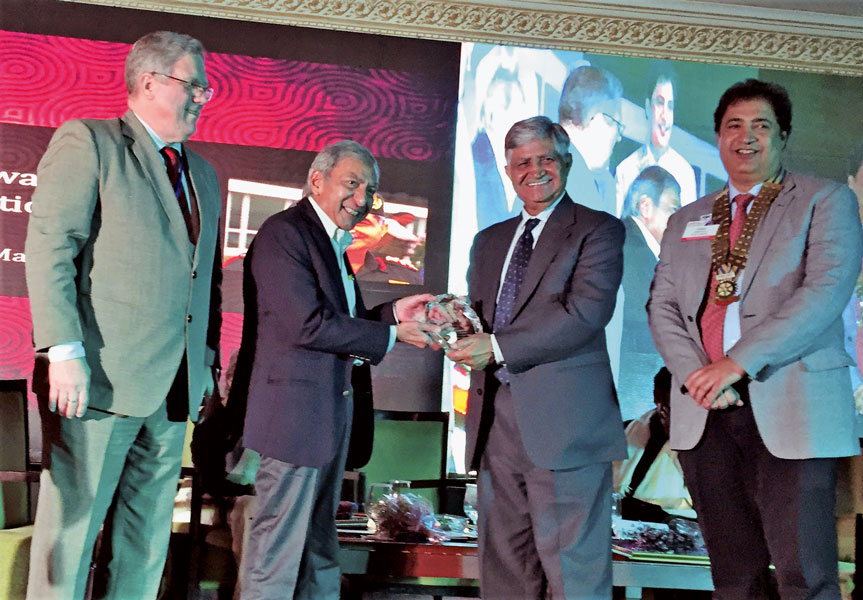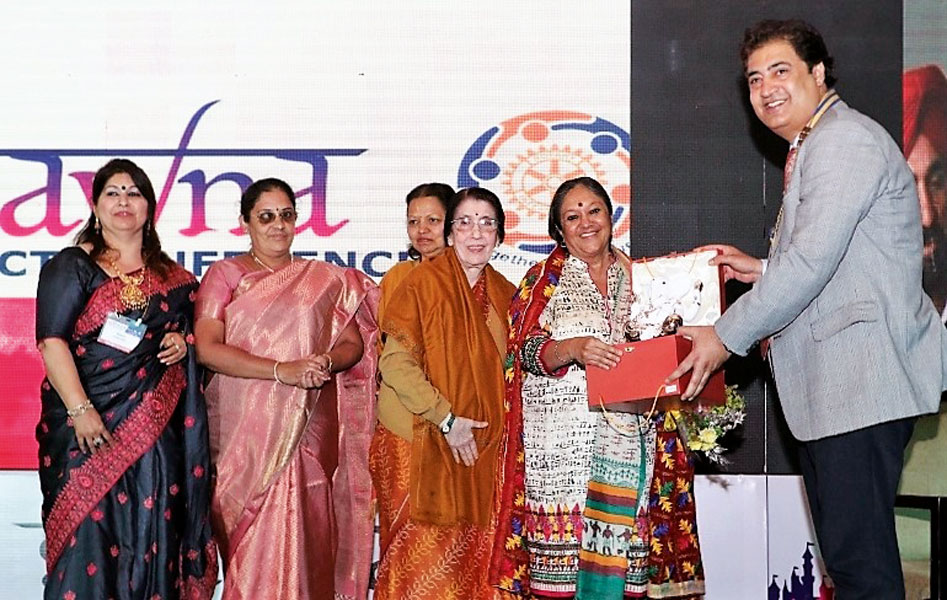We are all professionals here… after all Rotary is full of professionals and I’d like to talk about how professionals have to deal with politicians because there is so much of politics in our lives today,” Gen V P Malik said while presiding over a session of Sadbhawana, the District Conference of D 3080, where Shreyas Awards were given to three top professionals — Renana Jhabwala of SEWA, columnist Jug Suraiya and cricketer Chetan Sharma.

Thanks to the media, “today we are getting to know more and more about politicians than professionals. About 90 per cent of the content of newspapers and news channels comprises politics. “They talk about a political event day after day after day, as has been happening recently with Tamil Nadu. And the result is that the professionals are getting left behind and their stature is diminishing.” He was grateful to RID 3080 for recognising these three outstanding professionals for their contribution to society.
Going down memory lane, Gen Malik shared some of his experiences with politicians. Just a few days before his appointment as Army Chief, the then Defence Minister had called him and said you are going to be appointed Army Chief, and asked him: ‘Do you believe in democracy?’
I told the Prime Minister I don’t do any netagiri, I am a soldier and I have to speak the truth. If I had said anything different, my soldiers would have looked at me with suspicion and wondered why is he indulging in double talk.
— General V P Malik
“This came as a total surprise to me and I said why are you asking me this question. I have grown up in Indian democracy, sworn by the Constitution of India when I was commissioned, so I find this question odd.” The Minister explained to him that he was after all a neta and “when we have to get work done, we will pass it to you.” When asked to spell out the “work” he said: “postings and promotions for which I will send you messages.”
Gen Malik said he found this rather odd as only a few days earlier he had told the media there was too much of interference in the Army promotions which he was not going to permit. “So I told the Minister: ‘Sir, if I get appointed, my job will be to serve the country first, next the organisation and as I’ve learnt in the Indian Military Academy, think about myself only next. So if you ask me to do something that is in the interest of the country, or the organisation I will do it, but if it is not in the interest of both, but only you and I, I won’t do it.’ So this is the kind of interaction that takes place between professionals and the politicians!”
Sharing another significant moment, Gen Malik said that just before the Kargil war, when the firing had started on the LoC, “one day, the Prime Minister told me, General saab, yeh firing bandh karaiye. (Please stop the firing.) I asked him, are you serious? When we post the men on the border along the LoC, it is to fire back when somebody fires at them or to stop the infiltration. Under those circumstances I am not in a position to ask them to stop. If you want no firing to take place, I am afraid we will have to withdraw our troops from the LoC.”

That was a professional answer, which was accepted and the PM didn’t say anything after that.
Another interesting incident pertained to the Army being short of weapons during the Kargil war; “everybody knew it, and at a press conference during the war, one journalist asked me it is well known the Indian Army is short of weapons and equipment, so how are you going to fight this war. And I said we shall fight with whatever we have.”
The media made much noise about it saying the Army Chief admits shortage of weapons. After a few days, the Prime Minister asked him: “General saab, woh baat aapko kehni chahiye thi?” (Should you have said such a thing). I said that was the truth. I don’t do any netagiri, I am a soldier and I have to speak the truth. If I had said anything different, my soldiers would have looked at me with suspicion and wondered why is he indulging in double talk. And they would not have obeyed my orders. So what I said was correct, I couldn’t have said anything else. That went home and after that nobody said anything more about it!”
I accept this award in the name of millions of women who work as domestic labour in our homes, street vendors, farms, etc. They don’t need charity but dignity, respect and recognition.
— Renana Jhabwala
He said he was recalling all this “because today when there is so much politics in our lives, the professionals have to stand up and follow their professional dharma…. which is that all the principles and righteousness that you have learned in your profession must come first in the good of the country. We do not have to beg or turn sycophants. We must do what we believe in and what we have learnt.”
Gen Malik urged all professionals to follow the six principles he had always followed in his life.
- Is my action within or outside the law?
- Am I working honestly without prejudice of any kind?
- Will my work be appreciated today, tomorrow, and thereafter?
- How will my action appear to the media? Because the media believes in, or will speak the truth sooner or later.
- If any child asks me about my action, will I be able to speak the truth and convince him?
- Last, will I be able to sleep well tonight with satisfaction of having spent a good day?
Renana Jhabwala, National Coordinator and Chairperson of SEWA (Self Employed Women’s Association), was given the Shreyas Award for “her untiring work with self-employed women of India”. Educated at the Harvard University where she did an additional degree in maths, and later Yale, where she did a PG course in Economics, she has worked for decades in organising women in the informal sector. A Padmashri, she has worked intensively with beedi workers, agricultural labourers, garment workers and street workers to bargain for them higher income and better working conditions.

Accepting the award as “a recognition for the millions of women who are invisible to the rest of society… women who we see and yet actually don’t see”, she said these poor and self-employed women worked in homes as domestic labour, as street vendors, in the farms, etc, and through their work they provide a service to society. “Please do recognise that we have millions of these women; they don’t need charity but dignity, respect and recognition.”
Columnist Jug Suraiya, who was described by Khushwant Singh as “our own Art Buchwald”, was given the award as he has “become a part and parcel of our lives through his column, and for his unforgiving wit and humour and prolific contribution to India journalism”, said the citation.
Accepting the award, the columnist, in his typical satirical vein said, “When I am asked what do you do for a living, my reply tends to be: ‘As little as possible.’”
Striking a serious note, he said, “One of the most common and dangerous traps a writer, columnist or journalist can fall into is believing that he or she is an important person. No writer is an important person. The only important person is the reader. Because without the reader, the writer is nothing, a nobody.”
A dangerous trap a writer, columnist or journalist can fall into is believing that he or she is an important person. No writer is important; the only important person is the reader. Without the reader, the writer is nothing, a nobody.
— Jug Suraiya
Accepting the award, Chetan Sharma thanked DG Raman Aneja for honouring him and said, “for a sportsman, there is no higher award than recognition and respect”. He added that he as a kid used to go to school on a bicycle and would have remained a nobody but for cricket and the State of Haryana giving him encouragement.
Inaugurating the DisCon, Haryana Governor K S Solanki commended the work done by Rotarians in going beyond themselves and serving the community. Rotary’s contribution to making India polio-free would never be forgotten, he said.

Giving the background of the Shreyas Awards, PRIP Rajendra Saboo said the objectives of Rotary are high ethical standards in business and profession, opportunity for service, reaching out to the community, mobilising youth energy, etc. “We also felt we need to recognise those people who have excelled in their professions to enrich society and community… the name Shreyas was chosen as those being awarded were the topmost professionals in their field; “after all there can be nothing above Shreyas.”
PRID Yashpal Das presided over the session and introduced the awardees.
RIPR R Theenachandran said Rotary and Rotarians were doing amazing work in changing lives. Whether it was malnourishment, disease, unemployment, poverty, and other kinds of distress, Rotarians across the world were engaged in chipping away at these day after day. Peace would come to this conflict-ridden world only after all these evils were eliminated, he said.
Usha Saboo, spouse of PRIP Raja Saboo presided over a special session that discussed the importance of Rotarian spouses and how they could add value to Rotary.
Addressing the conference DG Raman Aneja said this being the Centennial of TRF, his goal was to collect $1 million from D 3080, and he felt this was not a steep target. Some of the highlights of his year were a medical mission to Gabon in Africa, Morena in Madhya Pradesh; two more medical missions will be done in Himachal Pradesh and one is planned in Mongolia in May.
Aneja added that the District has already completed 32 schools at Rudraprayag and an eye hospital at Panipat. The global grants, which include 36 Happy Schools, is under completion. On February 17, two more global grants have come and with these 19 Happy Schools, 120 e-learning centres, one computer centre, a dental van and an ICU ambulance would be set up. The District was going to do a big organ transplant project with the Post Graduate Institute of Medical Sciences in Chandigarh.





